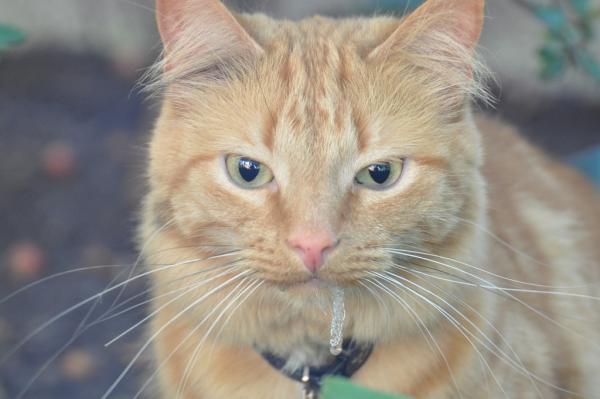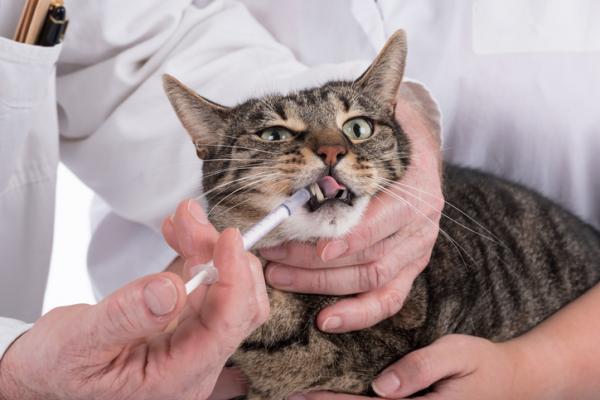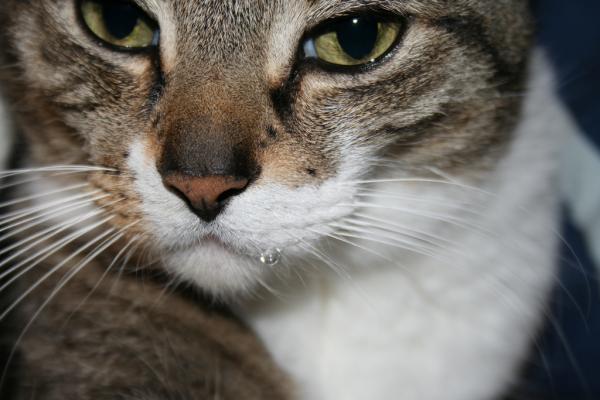Why does my cat drool when I give him medicine?

Most people who have cats when it comes time to medicate them start shaking. They know it’s going to be a stressful situation both for them and for their pet and, therefore, it is very important to transmit to the cat tranquility and that the process lasts as little as possible.
In this article we will talk to you about why a cat drools when we give medicine, we will show you tricks so that the cat suffers less stress and we will see what other circumstances can cause a cat to drool.
Why does my cat drool when I give it syrup?
Giving oral medication to a cat is not simple or fun. The first drawback we find is how to properly hold a cat while trying to introduce the drug in the mouth of the animal and, later, that the medicine falls inside and does not expel it. All this without taking a claw or bite from our pet.
Many people find that liquid medications are easier to administer than other types, such as pills, capsules, eye drops or injections. But still, it requires patience, precision and a bit of strength so that the cat stays still and swallows the correct amount.
On the other hand, it may seem that our cat is suffering from negative reaction to the medication, since it is common to see the cat with foam in the mouth after administering a liquid medication. In principle, this should not be the case, because the drug prescribed by your veterinarian is fully suitable for cats and has passed through the necessary controls before going on the market. The cat drools when you give medicine because try to eject content of unpleasant taste in his mouth.
How to give syrup to a cat that does not want to?
Something that worries people who have cats is that as the cat drools the syrup, it may be that is not taking the right amount. Many medications are absorbed transmucosally, through the skin inside the mouth, so that, as long as the cat keeps the drug in the mouth, it is being absorbed. In this way, the amount of medication that is expelled in the slime is much less than it seems.
Next, we will give you some helpful tips to facilitate the process of giving syrup to your cat:
- Liquid medications come with a dropper or syringe for administration. You must fill it with the amount that the vet indicated, never again, even if you think what part comes out.
- With one hand you must hold the cat’s head and with the other, insert the syringe through one of the corners, between the cheek and the molars, pointing towards the back of the cat’s head. If you need help and there is no one at home who can help you, you can wrap the cat in a towel, leaving only the head out.
- Never tip the cat’s head up, because it can inhale the medicine and cause problems at the level of the respiratory system. Once the syringe is correctly positioned, press the plunger until it is empty.
- Then you can keep the cat’s mouth closed for a few seconds, stroking the throat or blowing on your nose to stimulate swallowing.
- In the end it is very important to offer the cat a prize for Positive the situation.

Adverse reactions to medication in cats
In rare cases, a medication can cause an adverse reaction to your cat. If this happens, it is best to go immediately to the veterinarian.
Signs that your cat is suffering from a reaction to a drug:
- Swollen face.
- Difficulty breathing (suffocation, panting, strange cough, etc.).
- Collapse.
- Partial paralysis of the extremities.
- Persistent vomiting It is normal that the cat tries to vomit and that, once it does, it feels better, because it will have expelled the medicine. The problem appears when the vomiting is persistent. Vomiting between 2 and 4 times in less than 8 hours is a matter of veterinary urgency.
Other reasons why a cat drools
Sometimes, your cat may drool when you give medicine as a result of another problem and not for the drug itself. If so, it is usual to watch the cat drool in other circumstances that may vary depending on the cause:
- Oral disease: the accumulation of tartar can cause the cat to drool. You can try to lift the lip and see if the teeth have the appearance of cement, if the gum is inflamed or even bleeds. Ask your veterinarian to check if the cat has gingivitis, ulcersotumors.
- Problems swallowing: while he is playing he has been able to swallow part of the toy and have become entangled in the language. You can try to take it off or call the vet to help you. In addition, he has been able eat something unpleasant, like an insect with bad taste.
- Badly administered pipette: if you have placed a pipette and you notice that it starts to salivate excessively, the cat may drool through the pipette, otherwise, if we do not throw it in the indicated place has been able to reach the liquid with the tongue.
- Heatstroke: flat-faced cats, like Persian cats, are more likely to suffer heat stroke. Although, in general, cats usually suffer less heat stroke than other species, it is important that the cat has fresh and clean water always available.
- dizziness: cats do not usually travel much by car, just to change residence or go to the vet. This situation is Highly stressful for cats. Panting and breathing with your mouth open can cause the cat to drool. In general, any stressful situation can cause this.

This article is merely informative, in .com we do not have the faculty to prescribe veterinary treatments or make any kind of diagnosis. We invite you to take your pet to the veterinarian in case of any type of condition or discomfort.
If you want to read more articles similar to Why does my cat drool when I give him medicine?, we recommend that you enter in our section of Other health problems.


